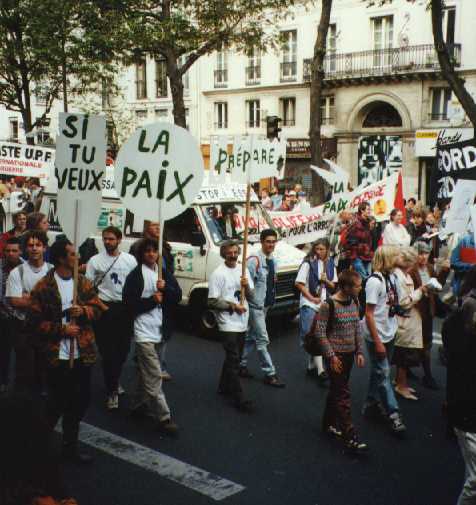 |
| Demonstration against French nuclear tests in 1995 in Paris. Wikipedia Commons. |
This distinction between what is personal and what is professional is profound, and it is a timely discussion as well. For example, just last week many of us were reading about how some employers were asking for employee’s passwords to their social media accounts, in order to… Spy? Eavesdrop? Although the outcry was loud, and laws are now being passed against this intrusion of privacy, it does appear as if the assumed line between the personal and the professional is being actively renegotiated. Indeed, last year there was a great deal concern about a budding new practice where employers were asking potential employees for their credit report.
To control the lives of one's employees is not a new thing. Consider the great capitalist Henry Ford. Ford was ruthless in how he worked to control his workers personal, professional, and spiritual lives. Indeed, there is always been an attempt by many employers to control their employees fully, to make one's personal life fall in line with the expectations of one's professional life. If you can control an employee, then you can better control how your company is "branded" out in the real world. After all, society doesn't want their K-12 teachers also moonlighting in strip joints. It just looks bad. Businesses don't like to look bad.
But we have to decide how much power we, as employees, will give over to businesses and corporations. This is not a one-sided negotiation, but very much a two-sided discussion. The recent issue regarding whether or not businesses can decide who can get what medications through Insurance, is another huge topic on the table. The issue? Birth control. Besides being a religious debate, as many businesses are claiming the issue of morality within their decision-making, this debate has the potential to affect and encourage selective medical decision-making regarding what medication is good for whom. It is bad enough that insurance companies make these medical decisions, individuals who have no medical degree, to right to "doctor," but we certainly do not need our employers making this decision as well. I'm not suggesting that denying birth control becomes an absolute slippery slope, but the door is open to then start denying other forms of medical care .... should this company or that person deem the care immoral. Since employees pay a good portion of their medical insurance coverage at most companies, it seems to me that this issue should remain private (between the patient and his or her doctor), not public (between the patient, the doctor, and the patient's employer).
Many of these issues come down to how we view public vs private spheres of living and life. As technology starts to erode many of our assumed moments of privacy, and private spaces, this situation also creates problems regarding private versus professional life and living. In your opinion, where should this line between the personal and the professional be drawn? How much control should a company be allotted over its employees? I would be interested in your thoughts on this.